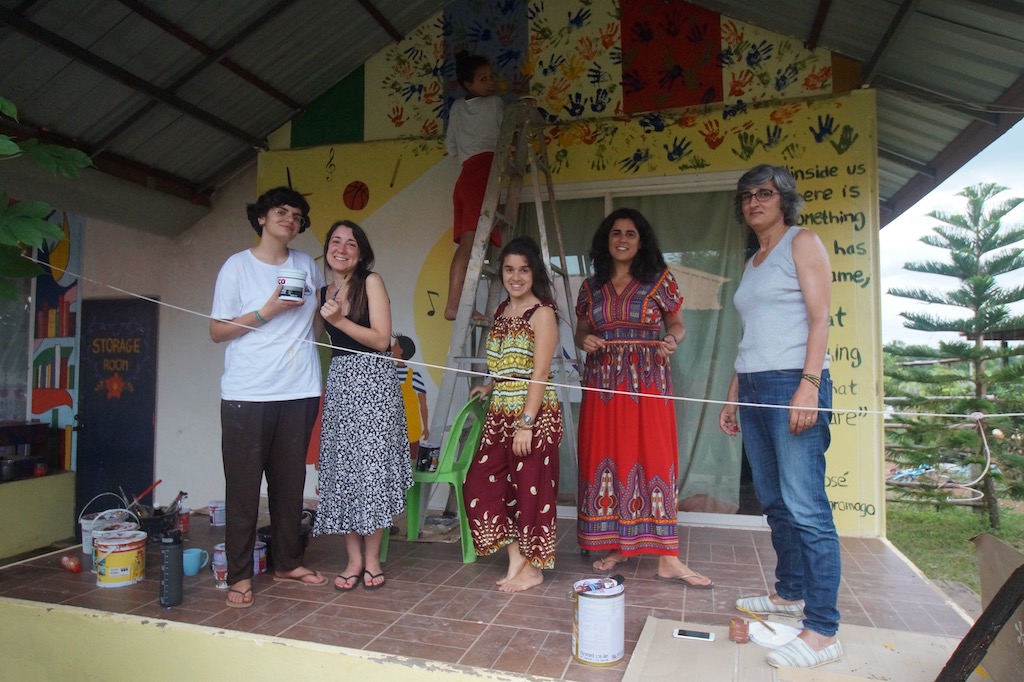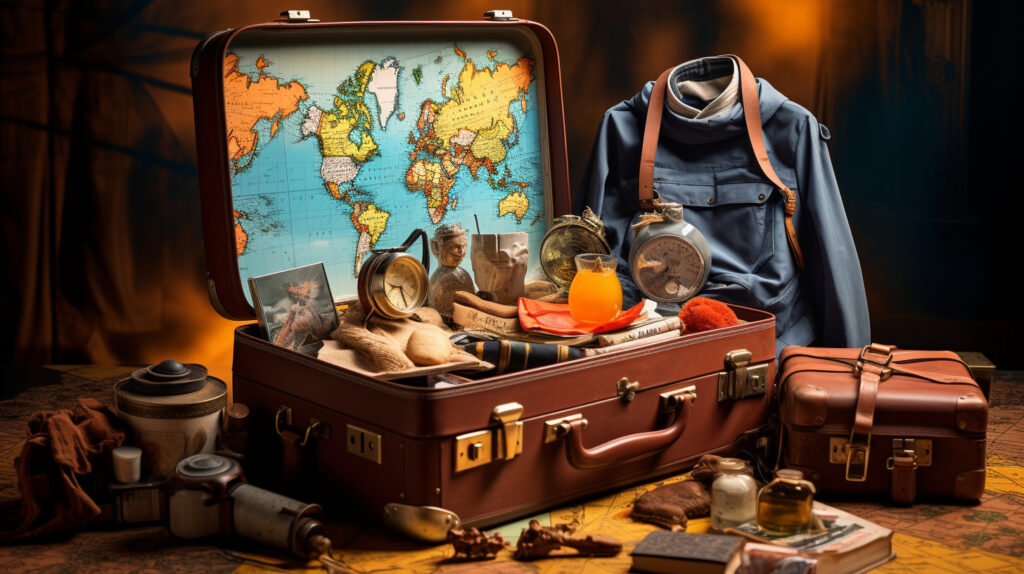Hey there, adventurer! Are you planning on embarking on an exciting volunteering trip abroad? That’s fantastic! Volunteering overseas is not only a rewarding experience, but it also provides an opportunity to make a positive impact on communities and gain a deeper understanding of different cultures.
As you begin preparing for your trip, one of the most important things to consider is how to pack and what to bring with you. Ensuring that you have all the necessary essentials will make your journey smoother and more enjoyable.
In this comprehensive packing list, we’ll cover everything you need to know about packing for a volunteering adventure abroad. From researching your destination to maximizing luggage space and preparing for different volunteering activities, we’ve got you covered. So grab your pen and paper, and let’s dive in!
Before we begin, keep in mind that it’s essential to do your own research and consult with your volunteering program or organization for specific requirements and recommendations.
Let’s start with the first section: Researching Your Destination.

Researching Your Destination
When preparing to volunteer abroad, it’s essential to thoroughly research your destination. Understanding the local culture, climate, and health considerations will help you pack appropriately and make informed decisions during your trip. Here are some key areas to focus on when researching your destination:
Understanding Local Culture and Customs
Each country has its own unique customs and traditions, and it’s important to respect and adhere to them during your time abroad. Researching the local culture will not only help you blend in better but also show respect for the local community. Some aspects to consider include:
- Greeting customs: Familiarize yourself with the traditional greetings in the local language, such as handshakes, bowing, or kissing on the cheek.
- Body language: In some cultures, certain gestures or physical contact may be considered offensive or inappropriate. Be aware of these cultural nuances and adjust your behavior accordingly.
- Dress code: Some countries have specific dress codes for certain locations or occasions. Research what is considered appropriate attire for your volunteering project and any cultural sites you plan to visit.
Researching Climate and Weather Conditions
Understanding the climate and weather conditions of your destination will help you pack suitable clothing and gear. Consider the following factors:
- Season: Determine what season your destination will be experiencing during your visit, as this will dictate the type of clothing and accessories you need to pack.
- Temperature range: Research the average temperatures to know what to expect. This will guide you in choosing the right clothing layers, from lightweight options to warmer garments.
- Rainy or dry season: Some countries have distinct rainy or dry seasons. Adjust your packing list accordingly, with items like umbrellas, raincoats, or sun hats.
Knowing Health and Safety Considerations
Keeping yourself healthy and safe while volunteering is crucial. Here are some important health and safety considerations to look into:
- Vaccinations: Check if there are any required or recommended vaccinations for your destination. Consult a healthcare professional or visit a travel clinic to ensure you are up-to-date with your immunizations.
- Healthcare facilities: Research the availability and quality of healthcare facilities in your destination, and find out if you need any additional health insurance coverage.
- Safety precautions: Familiarize yourself with local safety guidelines, such as which areas to avoid, transportation safety tips, and emergency contact information.
By taking the time to research these aspects of your destination, you’ll be well-prepared and able to adapt seamlessly to the local culture and environment. This will enhance your volunteering experience and contribute to a positive impact in the community you are serving.

Packing Essentials
When you’re preparing for a volunteer abroad program, packing efficiently and bringing the right items is essential. Here are some packing essentials to consider:
Appropriate Clothing for Various Activities and Weather
- Research the climate: Before packing, check the weather conditions of your destination during the time of your volunteer program. This will help you determine the appropriate clothing to bring.
- Layering is key: Opt for clothing that can be layered. This allows you to adapt to different temperatures throughout the day.
- Pack versatile items: Choose clothing pieces that can be mixed and matched easily. This helps you pack lighter and gives you more outfit options during your stay.
- Consider local customs: Research the local culture and dress code expectations. Make sure you pack clothing that is respectful and appropriate for the local customs and traditions.
Essential Toiletries and Personal Care Items
- Travel-sized toiletries: Opt for travel-sized toiletries to save space in your luggage. You can also purchase some items, like shampoo and soap, at your destination if necessary.
- Sunscreen and insect repellent: Depending on your destination, these items might be essential for your safety and comfort.
- Prescription medications: If you take any prescription medications, make sure to bring enough for the duration of your trip. It’s also a good idea to carry a copy of your prescriptions in case they are needed.
Travel Documents and Identification
- Passport: Ensure that your passport is valid for at least six months beyond your planned departure date. Keep a copy of your passport in a separate location in case of loss or theft.
- Visas and permits: Research the visa requirements for your destination country. Apply for any necessary visas or permits well in advance of your departure.
- Flight tickets and itinerary: Print out or save electronic copies of your flight tickets and travel itinerary for easy reference.
- Emergency contact information: Keep a list of emergency contacts, including the contact information of your program coordinators and the nearest embassy or consulate.
Electronics and Power Adapters
- Universal power adapter: Check the plug types used in your destination country and bring a universal power adapter that is compatible.
- Camera and charger: Capture your volunteer experience by bringing a camera. Don’t forget to bring a charger and extra batteries.
- Mobile phone: Consider bringing an unlocked mobile phone that can be used with local SIM cards for cheaper communication options.
- Portable charger: A portable charger can be a lifesaver, especially if you’re out and about all day and don’t have access to power sources.
First Aid Kit and Medications
- Basic first aid supplies: Pack a small first aid kit with items like band-aids, antiseptic wipes, pain relievers, and any other medication or supplies you may need for minor injuries or illnesses.
- Prescription medications: If you have any pre-existing medical conditions, make sure to bring an ample supply of your prescription medications.
- Medical records and insurance: Carry copies of your medical records and insurance information, including emergency contact numbers.
Remember, packing light and efficiently will make your travel experience much more enjoyable. Be mindful of any weight restrictions imposed by airlines or volunteer organizations. Plan ahead and pack according to your specific needs and the requirements of your destination.
Organizing and Maximizing Luggage Space
When it comes to packing for your volunteer abroad trip, organizing and maximizing luggage space is key. You want to ensure that you have everything you need without having to carry around a bulky and heavy suitcase. Here are some tips to help you make the most of your luggage space:
Choosing the Right Travel Bag or Backpack
- Consider the size and weight: Opt for a travel bag or backpack that is lightweight and fits within the airline’s size restrictions for carry-on luggage. This will save you from having to check in your bag and potentially risk it getting lost.
- Look for compartments and pockets: Choose a bag that has multiple compartments and pockets. This will help you stay organized and easily find your belongings when you need them.
- Consider a waterproof or water-resistant material: Depending on your destination and the activities you’ll be participating in, it may be beneficial to have a bag that is waterproof or water-resistant. This will protect your belongings from any unexpected rain or water-related mishaps.
Utilizing Packing Cubes or Compression Bags
- Invest in packing cubes: Packing cubes are a game-changer when it comes to organizing your luggage. They are essentially small, lightweight fabric containers that allow you to divide your clothing into separate compartments. This not only keeps your items organized, but also makes it easier to find what you need without having to dig through your entire bag.
- Try compression bags: Compression bags are a great option if you need to pack bulky items such as jackets or sweaters. These bags allow you to compress your clothing by removing excess air, making them take up less space in your luggage.
Rolling or Folding Clothes for Efficient Packing
- Roll your clothes: Rolling your clothes instead of folding them can save a significant amount of space in your luggage. Not only does it help to prevent wrinkles, but it also allows you to fit more items into your bag.
- Fold strategically: If you prefer folding your clothes, try using the KonMari method of folding. This technique allows you to fold your clothes into neat rectangles, making them easier to stack and pack tightly.
Remember, the key to maximizing luggage space is to pack strategically and efficiently. Take some time to plan and prioritize what you truly need for your volunteer abroad trip. It’s better to pack light and have the flexibility to bring back souvenirs or donations from your project site. Happy packing!

Preparing for Different Volunteering Activities
Volunteering abroad offers a unique opportunity to make a positive impact on communities around the world. Whether you’re teaching children, working on an environmental project, providing medical care, or building infrastructure, it’s important to prepare yourself for the specific activities you’ll be involved in. Here are some tips to help you get ready for different volunteering activities:
Teaching and Education Programs
If you’re planning to volunteer in a teaching or education program, it’s essential to bring materials and resources to enhance the learning experience for the students. Here are some things you may want to consider:
- Teaching materials: Pack educational materials such as books, flashcards, or worksheets based on the language or subject you’ll be teaching. These resources can help facilitate hands-on learning and make the lessons more engaging.
- Interactive games and activities: Including games and interactive activities can make learning fun for the students and help them grasp concepts more easily. Consider packing board games, puzzles, or arts and crafts supplies.
- Multimedia aids: Depending on the project, you may have access to technology such as computers or projectors. If so, bring educational videos or presentations to enhance the learning experience.
Environmental Conservation Projects
For those passionate about conservation and environmental projects, here are some items that can come in handy during your volunteer experience:
- Outdoor gear: Make sure to pack appropriate clothing, including sturdy shoes, long-sleeved shirts, and pants to protect yourself from various elements while working outdoors. Don’t forget hats, sunglasses, and sunscreen to shield yourself from the sun.
- Gardening tools: If you’re involved in gardening or planting trees, consider bringing gloves, gardening tools like shovels or pruners, and reusable water bottles to stay hydrated.
- Field guides and reference books: To deepen your knowledge about local flora and fauna, bring field guides or reference books specific to the region you’ll be working in. These resources can help you identify plants, animals, and understand the ecosystem better.
Medical and Healthcare Volunteering
When participating in medical and healthcare volunteering programs, it’s crucial to prepare and bring the necessary supplies to ensure the well-being of the community you’ll be serving. Here are some items you should consider packing:
- Medical supplies: Pack basic medical supplies such as gloves, bandages, thermometer, antiseptics, and over-the-counter medications. However, it’s important to check with the organization you’ll be volunteering with as they may have specific requirements or provide the necessary medical equipment.
- Medical reference materials: Bring medical literature or reference materials to help you stay informed about common health issues and treatments in the area you’ll be working in. This knowledge will assist you in providing the best possible care to the community.
- Language translation tools: If you’re volunteering in a location where you may not be fluent in the local language, consider bringing translation tools or language apps that can help with communication between you and the patients.
Construction and Infrastructure Projects
Those participating in construction and infrastructure projects need to be prepared with the right tools and gear for their work. Here are some essential items to consider packing:
- Protective gear: Construction sites often require safety equipment such as hard hats, safety glasses, work gloves, and steel-toe boots. Make sure to pack these items to ensure your safety during the project.
- Tools: Depending on the specific project, you may need to bring tools such as hammers, screwdrivers, saws, or measuring tapes. It’s advisable to coordinate with the organization to understand what tools will be provided on-site and what you should bring.
- Work clothes: Pack durable work clothes that you don’t mind getting dirty or damaged during construction work. Consider long-sleeved shirts, pants, and work boots for maximum protection.
Remember, the specific requirements and guidelines for each volunteering activity may vary, so it’s crucial to communicate with the organization you’ll be volunteering with. They will provide you with detailed information on what to pack and what will be provided on-site. Also, be open to learning and adapting to the local customs and practices while volunteering. Your flexibility and willingness to immerse yourself in the local culture will not only enhance your experience but also make a positive impact on the community you’re serving.
Money, Communication, and Safety
When volunteering abroad, it’s essential to be prepared when it comes to managing your money, staying connected with loved ones back home, and ensuring your personal safety. Here are some tips to help you navigate these important aspects of your volunteering trip:
Currency Exchange and Banking Options:
- Research the local currency: Before you travel, take the time to familiarize yourself with the currency used in your destination country. This will help you avoid confusion and make it easier to handle your finances.
- Notify your bank: Inform your bank of your travel plans, including the dates and countries you will be visiting. This will prevent your account from being flagged for suspicious activity when you use your debit or credit card abroad.
- Know the exchange rates: Stay updated on the current exchange rates so that you can have an idea of how much your money is worth in the local currency. This will help you budget your expenses more effectively.
- Carry a mix of payment methods: It’s a good idea to have a mix of cash, debit cards, and credit cards with you. In some countries, cash is more widely accepted, while in others, card payments may be more convenient. Having options will ensure that you’re prepared for any situation.

Communication Tools and Apps:
- Research the local communication options: Look into the availability of mobile networks and internet access in your destination country. This will help you decide whether you need to purchase a local SIM card or rely on Wi-Fi hotspots.
- Install communication apps: There are various communication apps that allow you to make free or low-cost calls and send messages over the internet. Some popular options include WhatsApp, Skype, and Viber. Download these apps onto your phone before you leave so that you can stay connected without incurring high roaming charges.
- Stay in touch with loved ones: Make sure to let your family and friends know your contact details while you’re volunteering abroad. This will give them peace of mind and enable them to reach you if necessary.
Personal Safety Measures:
- Research safety tips for your destination: Each country has its own safety considerations, so it’s important to research and be aware of any specific risks or precautions you should take. This may include avoiding certain areas, understanding local customs, or taking extra precautions when traveling alone.
- Keep important documents and valuables secure: Carry photocopies of your travel documents, such as your passport and visa, and keep them separate from the originals. It’s also a good idea to have a hidden money belt or pouch to store your cash and valuables while out and about.
- Share your itinerary: Provide a copy of your itinerary, including your accommodation details, to a trusted family member or friend. This way, someone will know where you are supposed to be at all times.
- Stay vigilant and trust your instincts: Trust your gut feelings and be aware of your surroundings. If something doesn’t feel right, remove yourself from the situation or seek help from a trusted authority figure.
Remember, the safety and well-being of volunteers are of paramount importance. By taking these money, communication, and safety precautions, you can have peace of mind and enjoy your volunteering experience to the fullest.
Cultural Sensitivity and Local Interactions
When volunteering abroad, it is essential to approach the local culture with respect and sensitivity. Engaging with the local community in a culturally appropriate manner not only enhances your experience but also fosters meaningful connections. Here are some tips to help you navigate cultural sensitivity and interact with locals effectively:
Learning Local Greetings and Phrases:
- Greetings: Taking the time to learn basic greetings in the local language can go a long way in establishing rapport with the locals. A simple “hello,” “thank you,” or “goodbye” in the local language shows your effort to connect with the community.
- Phrases: Familiarize yourself with key phrases that are commonly used in everyday interactions, such as “excuse me,” “please,” and “sorry.” This will help you navigate daily situations and communicate your needs politely.
Respecting Local Customs and Traditions:
- Dress Code: Research and adhere to the local dress code norms. In some cultures, modest clothing may be expected, especially when visiting religious sites or interacting with conservative communities. By respecting their customs, you show that you value and appreciate their way of life.
- Etiquette: Understand and abide by the local etiquette, which may differ significantly from what you are accustomed to. For example, it may be customary to remove your shoes before entering someone’s home or using your right hand for greetings and eating in certain cultures.
- Cultural Practices: Educate yourself about local customs and practices, such as gestures, taboos, and social norms. For instance, in some cultures, it is considered impolite to point at people or objects with your index finger. Being aware of these practices ensures that you navigate unfamiliar situations with sensitivity.
Interacting with Host Communities:
- Listen and Learn: Actively listen to the stories and experiences shared by the locals. This shows respect and genuine interest in their culture and traditions. Engage in conversations and ask questions to deepen your understanding and build connections.
- Participate in Community Activities: Volunteering is not just about the tasks you perform; it’s about engaging with the community. Embrace opportunities to participate in local activities, festivals, and celebrations. This allows you to immerse yourself in the culture and create lasting memories.
- Be Open-Minded: Approach cultural differences with an open mind and embrace the diversity you encounter. Understand that there may be different perspectives, beliefs, and practices, and it is crucial to accept and respect these differences without judgment. Your willingness to learn from others can lead to a more enriching experience.
Remember, volunteering is about building bridges and forming connections across cultures. By being culturally sensitive and respectful, you can create a positive impact and leave a lasting impression on both the local community and yourself.
Conclusion
In conclusion, preparing for your volunteer abroad trip is crucial to ensure a successful and rewarding experience. By doing your research, packing the right essentials, organizing your luggage efficiently, and preparing for different volunteering activities, you’ll be well-equipped to make a positive impact and immerse yourself in the local culture. Remember to consider factors such as money exchange, communication tools, and personal safety measures to enhance your journey. By practicing cultural sensitivity and respecting local customs, you’ll foster meaningful connections with the host communities and create lasting memories.
At A Broader View Volunteers, we understand the importance of a well-planned and organized volunteer trip. We offer a wide range of programs in various countries, providing opportunities for volunteers to make a difference while gaining a unique perspective on different cultures. Visit our website at www.abroaderview.org to explore our volunteer options and begin your journey towards a meaningful experience abroad.
Frequently Asked Questions
- What should I pack when volunteering abroad?
When volunteering abroad, it is important to pack essentials such as comfortable clothing, toiletries, first aid kit, travel documents, and any specific items required for the volunteer program. Researching the destination and program guidelines will help you determine the necessary items to pack.
- How should I pack my belongings for volunteering abroad?
While packing for volunteering abroad, it’s recommended to use a sturdy and secure backpack or suitcase that is compact and easy to carry. Use packing cubes or compression bags to maximize space and organize your belongings. Additionally, label your luggage properly to avoid any confusion.
- What important documents should I bring when volunteering abroad?
When volunteering abroad, make sure to carry essential travel documents including your passport, visa, ID cards, travel insurance, and any necessary permits or certificates required by the destination country. It’s also a good idea to have copies of these documents stored digitally or in a separate place.
- Why is it important to do research before volunteering abroad?
Doing research before volunteering abroad is crucial as it helps you understand the local customs, culture, and appropriate behavior. It also allows you to familiarize yourself with the volunteer organization, project goals, and any specific requirements or precautions for the destination.
- How should I research about the volunteer program and destination?
To conduct effective research, visit the volunteer organization’s official website, read reviews and testimonials from previous volunteers, join online forums or groups related to volunteering, and consult travel guides or blogs about the destination. Reach out to the organization directly for any specific queries.
-
Volunteering Abroad with Medical Missions: Make a Difference Today

Join medical group trips, Nurses Without Borders, and Dentists Without Borders to make a difference in underserved communities worldwide. Learn about the countries where these programs operate and read real-life experiences from volunteers. Volunteering overseas is an excellent opportunity to make a difference in the lives of others while experiencing new cultures and forging unforgettable…
-
Embrace Overseas Service | Transform Lives Through Global Volunteerism

International Volunteering: Discover Meaningful Travel and Transform Lives with A Broader View
-
A World of Opportunities: Unveiling the Benefits of International Volunteer Programs

Discover numerous benefits of international volunteer programs and unleash a world of rewarding opportunities with our in-depth guide.



